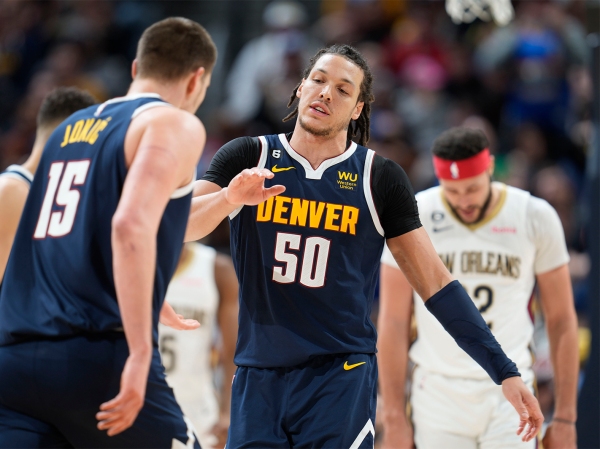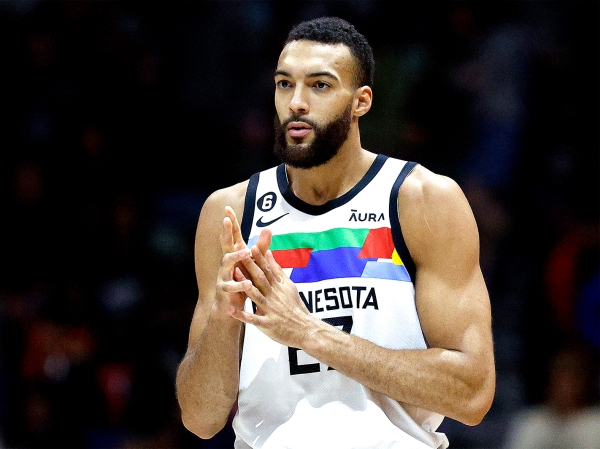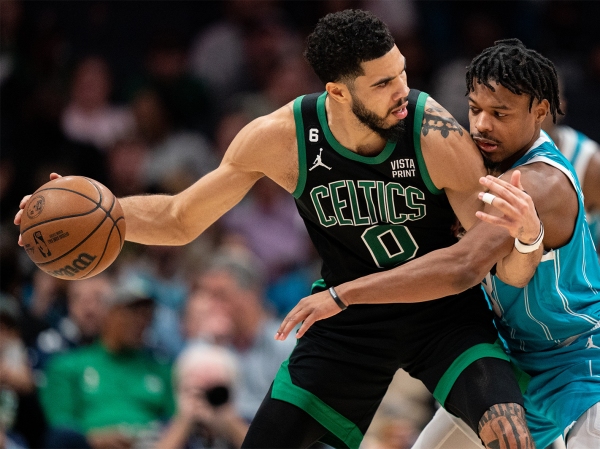Jaren Jackson Jr. Is The Defensive Player Of The Year Front-Runner — But He Wouldn't Be A Typical Winner

Petre Thomas / USA TODAY Sports via Reuters
Now in his fifth NBA season, Memphis Grizzlies forward Jaren Jackson Jr. has fully blossomed into the player the team envisioned he would be when it selected him with the No. 4 overall pick in the 2018 NBA draft. He’s averaging career highs in points and rebounds per minute, and setting new marks in scoring efficiency as well, with one of the league’s best true shooting percentages (.618).1
But Jackson isn’t known primarily for his offense. First and foremost, he is a full-fledged defensive monster, a player whose combination of size, length, agility and instincts is nearly unmatched leaguewide. It’s no accident that the Grizz ranked just 19th in the NBA in defensive rating before Jackson’s return from offseason foot surgery, according to NBA Advanced Stats, and are first by nearly 2 full points per 100 possessions since he got back.
It is also no accident that Jackson is, at the moment, the deserving front-runner to take home the Defensive Player of the Year trophy. But his candidacy for the award would follow a very different path than other winners from over the years, making him one of the most unique and interesting defensive anchors the league has seen in recent seasons.
Of course, in many ways, Jackson would be a pretty conventional DPOY winner. He’s the best defender on what is right now the best defensive team in the NBA, for example. The team with the league’s best defensive rating has produced seven previous DPOY winners, and the average rank in defensive rating for the eventual trophy-getter’s team has been 4.2. Not since Marcus Camby in 2007 has the winner come from a team ranked outside the top five in defensive rating, and that was one of only nine times in 40 seasons where that’s happened.
Jackson also leads the NBA in blocks per game (3.3) — or at least he would, if he qualified for per-game leaderboards. While the blocks leader hasn’t claimed the trophy since Dwight Howard in 2010, it used to happen fairly often before more advanced measurements of defense became popularized. One of those more advanced measurements is defensive estimated plus-minus, or defensive EPM, where the winner has ranked inside the top five in six of the past nine seasons. Jackson currently ranks first. The winner also has ranked inside the top 10 in defensive RAPTOR in eight of nine seasons, and Jackson currently ranks ninth.2
Like the archetypal DPOY winner of yore, Jackson is a hulking menace of a help defender, standing always at the ready to block, corral or otherwise deter opponents when they dare venture into the paint. According to Second Spectrum, 60 NBA players have provided support against 200 or more opponent drives so far this season. Jackson ranks first among that group in points allowed per possession when the play is finished by the driver or a teammate one pass away.
Driving the lane on JJJ is a very bad idea
Among NBA players with at least 200 drives defended, fewest points allowed per direct drive in 2022-23
| Player | Team | Drives Defended | Pts/Direct Drive |
|---|---|---|---|
| Jaren Jackson Jr. | Grizzlies | 230 | 0.815 |
| Nic Claxton | Nets | 369 | 0.832 |
| Giannis Antetokounmpo | Bucks | 222 | 0.833 |
| John Collins | Hawks | 203 | 0.843 |
| Isaiah Hartenstein | Knicks | 433 | 0.855 |
| Draymond Green | Warriors | 332 | 0.861 |
| Bismack Biyombo | Suns | 240 | 0.868 |
| Joel Embiid | 76ers | 627 | 0.881 |
| Brandon Clarke | Grizzlies | 240 | 0.881 |
| Mitchell Robinson | Knicks | 463 | 0.909 |
His timing as a shot-blocker is outstanding, and bordering on surreal. He makes ridiculous plays look routine, with stunning regularity:
Jackson led the NBA with a 7.4 percent block rate last season, but is absolutely demolishing that mark this year by swatting away 11.3 (ELEVEN POINT THREE!) percent of opponent 2-point shot attempts while on the floor. He doesn’t yet qualify for league leaderboards, but considering Nic Claxton is currently the NBA “leader” with the block rate of a mere mortal at 8 percent, it’s safe to say that once Jackson does qualify (which should happen within the next couple of weeks), he will again take residence atop the list. He’s fresh off blocking five shots in each end of a back-to-back against the Jazz and Spurs, and entered Wednesday having blocked at least three in six consecutive games.
There are, however, several reasons that Jackson actually claiming the hardware at the end of the season would be highly unusual.
First, there’s his age. The average Defensive Player of the Year has been 27.6 years old, while Jackson is only in his age-23 season.3 If he were to win the award, he’d tie Kawhi Leonard (2014-15), Dwight Howard (2008-09) and Alvin Robertson (1985-86) as the youngest Defensive Player of the Year in history.4
Next, there’s his availability. Jackson sat out Memphis’s first 14 games of the season while recovering from the aforementioned foot surgery, and has sat out twice more since then. Even if he were to play in every Grizzlies game for the rest of the year, he would then have played in 80.5 percent of possible games. The average DPOY has appeared in 94 percent of his team’s games, with only Leonard in 2015 (78 percent) and Rudy Gobert in 2018 (68.3 percent) failing to crack the 80 percent mark.
Finally, there’s his minutes load. The average historical Defensive Player of the Year has been on the court for 35.1 minutes per game. Jackson’s mere 26.3 minutes per game average would be by far the lowest for any player awarded this trophy. Not since Dennis Rodman got 29.0 minutes of per-game floor time in 1990 has a DPOY played fewer than 30 minutes a night, and the only other time it has happened was in 1987, when Michael Cooper played 27.5 per game.
One of several reasons Jackson’s playing time is so low is because of his pesky foul habit. He’s been whistled for 3.0 rule-violations per game despite his light workload — an extremely high figure. It would be a rarity for a player to foul so often and still win Defensive Player of the Year.
The award has been handed out 40 times, and only once has the victor fouled more often per minute than Jackson. (Dennis Rodman fouled 4.2 times per 36 minutes during the 1989-90 season, while Jackson is at 4.1 per 36 this year.) Even accounting for pace of play, just two prior Defensive Players of the Year have fouled more often on a per-possession basis than Jackson has so far this season (5.4 per 100 possessions): Rodman in 1989-90 (5.9 per 100) and Alonzo Mourning in 1999-2000 (6.0 per 100).
It makes a lot of sense that this would be the case. Fouls are damaging not just because they can result in the offending player being taken off the floor, but because they give opponents their easiest opportunities for points. Sending a player to the line for free shots is just about the worst thing a defender can do on any given possession. A player who fouls as often as Jackson thus has to provide a ton of value outside of those violations just to avoid being a negative defender, let alone one of the best in the NBA. Luckily for the Grizzlies, Jackson does just that — and not just with his shot-blocking.
He’s one of the most effective defenders against the league’s favorite tactic. Opponents have managed just 0.886 points per play on pick and rolls where Jackson defended the screener and the play was finished by the ball handler or a teammate one pass away, according to Second Spectrum. That ranks in the 91st percentile among the 113 players who have defended 200 ball screens or more. His athleticism allows him to handle perimeter players in space, and his size and length make it difficult for them to access the paint and especially the rim. Using his man to set a screen away from the ball isn’t any more fruitful: He ranks in the 92nd percentile among 79 players who have defended 200 or more off-ball picks.
Trying to score on Jackson in isolation? Again, he is among the top 10 percent of defenders who have defended 40 or more of them this season. Want to test him at the basket? Best of luck. There are 113 players who have challenged at least 3 shots per game, according to NBA Advanced Stats, and Jackson ranks first among that group in field goal percentage allowed (41.5 percent) when within 5 feet of both the shooter and the rim. The next-closest player is Draymond Green, more than 6 percentage points away.
The big question with Jackson at this point is whether he can stay healthy. Last season was ironically his best yet from a health standpoint, as he played 78 of 82 games. But foot injuries (like the stress fracture for which he required surgery following said season) traditionally do not pair well with players of Jackson’s size (he’s listed at 6-foot-11), and he’s also dealt with multiple knee issues, including a torn meniscus. His activity level and somewhat slight frame will likely always be cause for concern, especially given his history.
Long-term, that might be an issue the Grizzlies have to reckon with. In the immediate and near future, though, Jackson’s game-changing presence as a defender helps solidify his team as one of the league’s elite — and it puts him in the driver’s seat to win an award not many players with his experience or resume can say they’ve placed in the trophy case.
Check out our latest NBA predictions.



